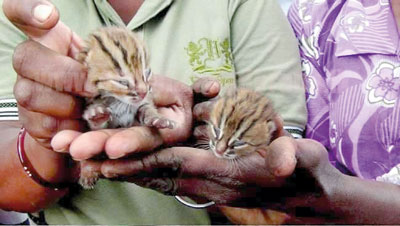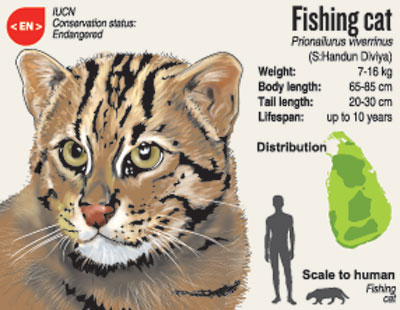News
‘Rescue’ of wild cat babies backfires
Two wild cat cubs were found in a tree cavity several days ago by workers at the Bogawantalawa tea estate. The mother could not be spotted so the workers carefully took the cubs away, thinking they had been orphaned.

Estate workers holding the cubs
The Nallathanniya Beat Office of Department of Wildlife Conservation (DWC) was alerted to the find on October 4 and rushed to the estate where they found that the cubs were young fishing cats only a few days old.
The cubs were in good shape, said wildlife ranger Prabash Karunatilleke. He told the people who found them it was best to take them back to their hiding place because their mother would return for them.
“Fishing cats usually hide their babies when they need to go out on brief hunting trips to find food. Perhaps the mother ran away in fright at the approach of the estate workers, but it would have been around,” Mr. Karunatilleke said.
Wildlife officers put the babies back in the tree cavity and cleared the area of people. When they returned to the site the next morning the babies were not there. Fresh pug marks around the tree indicated the mother had taken her babies to another hideout, Mr. Karunatilleke said.
The wildlife officers had acted sensibly in putting the cubs back in the tree cavity, fishing cat experts said, adding that worried members of the public often believe they are performing an act of kindness in “rescuing” apparently abandoned fishing cat cubs when in fact they were separating babies from their mother.
“If you find a fishing cat cub just check the surrounding area for predators. If the cub seems to be safe, just wait and keep your distance as the mother won’t come if it feels your presence,” fishing cat expert Anya Ratnayake said.
“If the mother does not appear even after about two hours, then there is a chance that the cubs have been orphaned due to some tragic thing having happened to the mother.
“Then, and only then, take the initiative to help them,” Ms. Ratnayake advised.
“The cubs of all our wild cats, including leopards, are adorable and it is difficult to resist the urge to help them, but being with the mother is their best chance of their survival.”
Carnivores are difficult to rehabilitate and be released back to the wild as grown animals, wild cat experts emphasised. It is difficult to teach a baby wild cat the techniques of hunting and other skills that cats need to survive in the wild and which they learn from their mother.

Fishing cat cubs found in Borella. Pic courtesy Urban Fishing cat project
Many fear the fishing cat, known as “handun diviya” in Sinhala. Ms. Ratnayake and fellow young fishing cat expert Ashan Thudugala are doing a good job trying to educate the public about this species.
The fishing cat is a medium-sized wild cat that lives in wetlands. They are nocturnal and secretive wild cats so studying them is difficult for researchers.
Fishing cats face many kinds of dangers. They adapt to wetlands in busy cities, even in Colombo, so are often run over and killed by accident when trying to cross roads.
They are also often caught in snares set primarily for wild boar in many areas. The loss of their wetland habitats is also a major problem.

